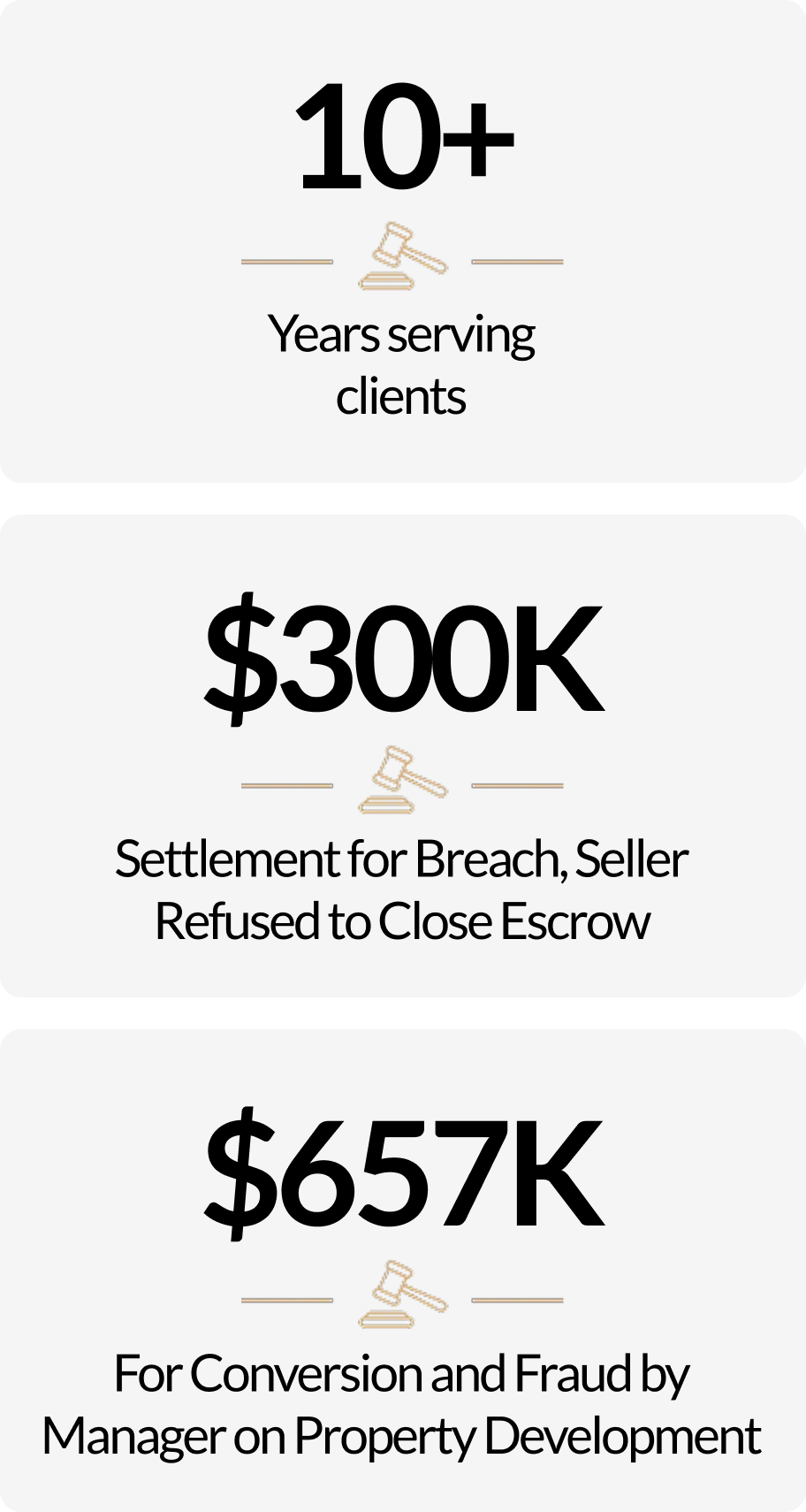Your Advocate in Real Estate Litigation
Assisting clients in resolving joint ownership problems, partition actions, quiet title disputes, ownership disputes, lis pendens issues, and clouded titles.

Fill out this form to start the conversation
Your Advocate in Real Estate Litigation

Fill out this form to start the conversation


Disclaimer: Case results are fact-specific. Attorneys cannot guarantee outcomes. See representative case results here.
At Litigation, P.C., our team is prepared to advocate on your behalf in all areas of real estate litigation.
Partition Action
The court evaluates the situation and determines the best method of partition, ensuring a fair resolution for all parties involved. Because partition actions can be legally complex and involve disputes over property value, ownership interests, and division, seeking legal representation is highly recommended. Litigation, P.C. assists clients in partition matters throughout Southern California, helping clients navigate the legal process efficiently.
Quiet Title Action – Ownership Disputes
Because quiet title actions can significantly impact property rights, seeking experienced legal counsel is essential. These actions are often used to resolve inheritance disputes, clear title after foreclosure, or address unclear property boundaries. Litigation, P.C. assists clients in quiet title matters throughout Southern California, ensuring clients receive expert guidance in protecting their property interests.
Clouded Title
Clearing a clouded title often requires a combination of legal and administrative steps, such as conducting a detailed title search to identify issues, negotiating or paying off outstanding liens, correcting errors in public records, or filing a quiet title action in court to establish clear ownership. Addressing these concerns is essential to protecting property rights and ensuring smooth real estate transactions. Given the complexities involved, consulting with an experienced real estate attorney can help property owners resolve disputes efficiently and secure their rightful ownership.
Easement Disputes
Resolving easement disputes typically involves negotiation, mediation, or legal action. In many cases, open communication can help clarify rights and responsibilities, preventing costly legal battles. When informal resolution is not possible, mediation provides a structured environment for compromise, while litigation may be necessary to establish or enforce easement rights. Proper documentation, such as easement agreements, property deeds, and historical records, is critical in proving claims. Given the legal complexities involved, consulting with a real estate attorney can help protect your property interests and ensure that easement rights are properly upheld.
Lis Pendens
Expunging a lis pendens may be necessary when it is improperly filed or used as a tactic to manipulate real estate transactions. California law allows affected property owners to seek a court order to remove a lis pendens if the claim lacks merit or if the court determines that adequate relief can be provided through other means. Improper filings can cloud a title, hinder transactions, and create financial burdens, making it essential to take legal action when necessary. If you are dealing with a lis pendens issue, consulting with a real estate attorney can help you navigate the legal process and protect your property rights.
After a business partnership to purchase and flip a property went sour, the clients were sued by their former partners for over a dozen claims, including fraud and theft of partnership funds. Kim assisted in attaining a settlement that forced the plaintiffs to sell their interest in the property to the clients at a significant discount after filing a cross-complaint, and extensive discovery showed the plaintiffs’ claims were unsubstantiated.
Kim represented a married couple who claimed they were tricked into signing a deed transferring their family home to the husband’s sister. The couple discovered they were tricked almost a decade later when the sister suddenly tried to evict them and listed the property for sale—attained a settlement after the couple filed suit against the original co-signers and joint tenants, the sister, and the bank holding a refinance mortgage, seeking to quiet title, and alleging multiple torts including conspiracy, fraud, and conversion.
Assisted in attaining a $657,545 bench judgment against a real estate agent who, while acting as project manager for real estate development, misappropriated the client’s funds entrusted to her for the project and instead used the funds for personal use. Kim worked to ensure that numerous forensic accounting methods and subpoenas were employed to uncover the full breadth of fraud and conversion. Judgment was for 100 percent of the amount sought.
After a business partnership to purchase and flip a property went sour, the clients were sued by their former partners for over a dozen claims, including fraud and theft of partnership funds. Kim assisted in attaining a settlement that forced the plaintiffs to sell their interest in the property to the clients at a significant discount after filing a cross-complaint, and extensive discovery showed the plaintiffs’ claims were unsubstantiated.
Kim represented a married couple who claimed they were tricked into signing a deed transferring their family home to the husband’s sister. The couple discovered they were tricked almost a decade later when the sister suddenly tried to evict them and listed the property for sale—attained a settlement after the couple filed suit against the original co-signers and joint tenants, the sister, and the bank holding a refinance mortgage, seeking to quiet title, and alleging multiple torts including conspiracy, fraud, and conversion.
Assisted in attaining a $657,545 bench judgment against a real estate agent who, while acting as project manager for real estate development, misappropriated the client’s funds entrusted to her for the project and instead used the funds for personal use. Kim worked to ensure that numerous forensic accounting methods and subpoenas were employed to uncover the full breadth of fraud and conversion. Judgment was for 100 percent of the amount sought.
Located in Los Angeles, CA | 424-284-2401
Located in Los Angeles, CA
424-284-2401
Meeting our clients' needs is our first and only priority. Ultimately, we only feel successful when our clients are happy throughout the entire process.

